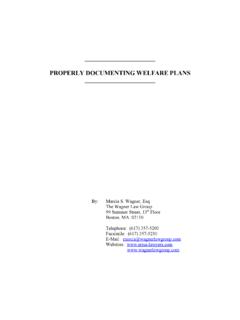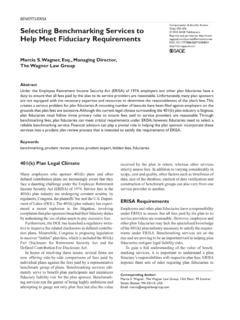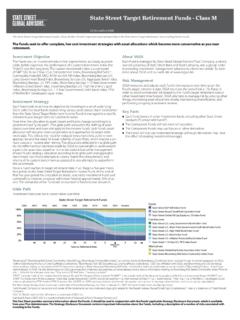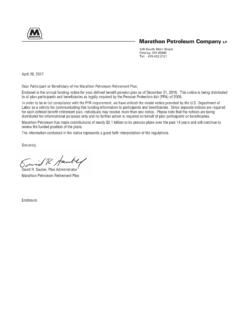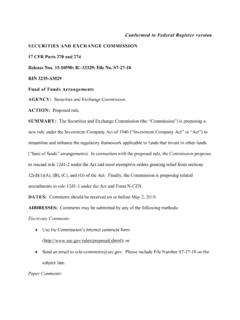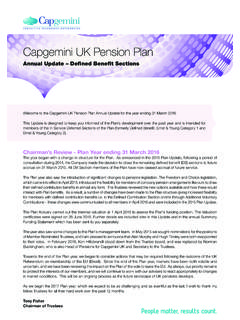Transcription of IS IT NOW TIME FOR MANAGED ACCOUNTS? - erisa …
1 IS IT NOW TIME FOR MANAGED ACCOUNTS? June 2009. by: Marcia S. Wagner, Esq. and Dennis T. Blair, Esq. The Wagner Law Group A Professional Corporation 99 Summer Street, 13th Floor Boston, MA 02110. Tel: (617) 357-5200. Fax: (617) 357-5250. TABLE OF CONTENTS. Page erisa SECTION 404(C) 1. [1] 1. [2] 2. [3] Disclosing Information INVESTMENT [1] Interpretive Bulletin [a] Plan [b] General Financial and Investment 4. [c] Asset Allocation [d] Interactive Investment 4. [2] Legal [a] Selection and 5. [b] Conflicted Investment [c] Investment Education Becomes Investment 5. [3] INVESTMENT 7. [1] Failure to 7. [2] Conflicted Investment [a] 7. [b] Pre-PPA DOL 8. [i] Advisory Opinion 97-15A (May 22, 1997) Frost 8. [ii] PTE 97-60 (November 4, 1997) Trust Company of the 8.
2 [iii] Advisory Opinion 2001-09A (December 14, 2001) 9. [iv] Advisory Opinion 2005-10A (May 11, 2005) Country Trust Bank 10. [v] Advisory Opinion 2005-23A (December 7, 2005) IRA Rollovers.. 10. [c] Principal Rollover IRA 11. [3] Statutory Exemptions for Investment 11. [a] Fiduciary 12. [b] Plan Sponsors' 12. i [c] 12. [d] 12. [e] Other [f] Effective 13. [4] DOL Investment Advice 13. [a] 13. [b] Field Advice Bulletin [c] Controlled Group [d] Proposed 14. [e] Final 15. [i] Fee-Leveling 15. [ii] Fee-Leveling Class [f] Effective 16. [g] 17. MANAGED [1] Plan [2] Plan 18. [a] Business [b] Minimizes Fiduciary 18. [c] Monitoring 19. [3] Financial [4] Public 20. [5] MANAGED Accounts as 20. FUND OF 21. [1] Conflict of Interest [2] Quality of 22.
3 [3] Quality of [4] Disclosure 22. [5] Target-Date 23. ii IS IT NOW TIME FOR MANAGED ACCOUNTS? Introduction The plunging stock market, severe market volatility, and utter devastation of many plan participants' account balances argue forcibly that it is no longer prudent, if ever it was, to leave the vast majority of plan participants in 401(k) or other defined contribution retirement plans to invest their own account balances with or without investment education or advice. From the point of view of minimizing legal risk, this article will argue1 that MANAGED accounts are the preferable solution to the asset allocation problem over investment education or advice, or default investment funds, such as balance funds and target-date In the early 1990's investment education was touted as the solution to plan participants'.
4 Poor asset allocation When investment education failed, the Pension Protection Act of 2006 ( PPA ) was enacted4 with provisions to facilitate investment advice and default investment funds, including target-date funds, as solutions to the asset allocation problem. These PPA provisions will also fail, although perhaps not as badly as investment education. For the reasons this article explains, MANAGED accounts will ultimately prevail as the solution in a back to the future development that will bring professional investment management to defined contribution plans that currently exist for defined benefit plans and that used to exist for defined contribution plans before participant-directed plans became so popular.
5 The critical difference is that professional investment management will apply separately to each account rather than to the defined contribution plan as a erisa Section 404(c) Regulations [1] Statute. The argument begins with erisa Section 404(c). It states that plan sponsors are not liable for any losses caused by a plan participant's own investment decision if the plan complies with certain plan design and disclosure requirements specified in Department of Labor ( DOL ) regulations. This relief from liability is one of the principal reasons that plan sponsors: design their 401(k) and other defined contribution plans to allow participants to direct the investment of their accounts;. comply with DOL's erisa Section 404(c) regulations.
6 1. Taking into account developments since 2003, particularly the Pension Protection Act of 2006, this article is an updated and enhanced version of the argument first published at Wagner, Marcia S., " MANAGED Accounts: Are they the Answer?," Tax Management Compensation Planning Journal, August 2003. 2. MANAGED accounts also can be default investment funds. See 29 (e)(4)(iii). 3. As in the next section, erisa 404(c), 26 1104(c), allows a plan sponsor to shift the fiduciary liability for the most important investment decision ( , asset allocation) to the plan participants. 4. 4, 109th Cong., 2nd Sess., 109-280, Aug. 17, 2006, 120 Stat. 780. 5. Before self-directed plans became popular, trustee-directed plans commonly used balanced funds for the plan as a whole.
7 These trustee-directed balanced funds also can be default investment funds. See 29 5(e)(4)(ii). The Court of Appeals for the Seventh Circuit in Hecker v. Deere & significantly expanded upon a plan sponsor's erisa Section 404(c) protection in two ways. First, the Seventh Circuit ruled that Deere complied with erisa Section 404(c) simply by making available a brokerage window as an investment alternative under its Second, the Seventh Circuit effectively ruled that erisa Section 404(c) protected Deere from liability for allegedly selecting and maintaining unreasonably expensive funds. The Seventh Circuit also ruled that erisa did not require Deere to disclose the revenue sharing arrangement among the service providers for its plan.
8 The Seventh Circuit's Deere decision will be valuable to other plan sponsors and their investment vendors defending against similar class actions alleging that the plan sponsors allowed the investment vendors to charge excessive fees to 401(k) plan participants. However, the Deere decision may be a Pyrrhic victory because it may provoke Congress in pending 401(k) fee legislation to overturn parts of the [2] Regulations. DOL's erisa Section 404(c) regulations published in 1992. contained three key requirements:9. First, the plan must offer a broad range of investment alternatives, including at least three diversified core options with each of those having different risk and return Second, employees must be allowed to transfer among these options with a frequency commensurate with the investments' market volatility, but at least as often as quarterly in the case of the core Third, employees must have access to sufficient information about each investment option so that they can make informed investment To meet the information disclosure requirement, these 1992 DOL regulations require plan sponsors to provide specific information, such as.
9 For each investment option, its investment objectives and risk and return characteristics, including type and diversification of assets; and for mutual funds or other investment options registered with the SEC, a copy of the most recent prospectus or profile ( , a summary of key information contained in a mutual fund prospectus). 6. Hecker v. Deere & Co., 556 575 (7th Cir. 2009). 7. According to the 7th Circuit, the plan participants had a reasonable opportunity to .. control the risk of loss from fees through the brokerage window. 8. See , 401(k) Fair Disclosure for Retirement Security Act, as introduced by House Education and Labor Committee Chairman George Miller in the 111th Cong., 1st Sess., April 21, 2009; and 2779, Defined Contribution Plan Fee Transparency Act, as introduced by House Ways and Means Select Revenue Measures Subcommittee Chairman Richard E.
10 Neal in the 111th Cong., 1st Sess., June 9, 2009. 9. 29 published at 57 Fed. Reg. 46932 (Oct. 13, 1992). 10. 29 (b)(1)(ii). 11. 29 (b)(2)(i)(A). 12. 29 (b)(2)(i)(B). 2. The Section 404(c) regulations specifically do not require the employer to provide investment They also do not require an employer to provide investment education, except to the extent that the regulations require the disclosure of the information on DOL's laundry list. [3] Disclosing Information Inadequate. Many employers were concerned that simply disclosing the information on DOL's laundry list was inadequate. These employers wanted their plan participants to understand investment principles that they could apply to their own financial situation, including their accounts under the employer's participant-directed defined contribution plan.
